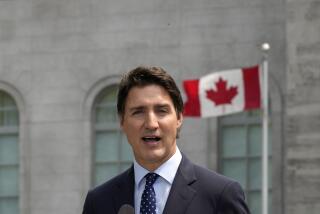Prospect for Canadian Reform Remains Hazy
- Share via
VANCOUVER, Canada — Canadians got a glimpse this weekend of the plan that is supposed to be the salvation of their country, and what they saw was a blend of good will and worrisome ambiguity.
“It’s nice and warm, but it’s also fuzzy,” said Moe Sihota, minister of trade from the province of British Columbia. “This warm and fuzzy stuff has now got to be crystallized in some fashion.”
Sihota was one of about 200 delegates to a weekend convention here on what constitutional reforms need to be made if Canada is to remain intact.
The delegates were highly motivated to come up with a plan, but to the extent they were able to agree, it was only on the most general of principles.
The delegates agreed that the Canadian constitution should be amended to guarantee a basic standard of living to all citizens. And they expressed a willingness to accommodate the truculent province of Quebec, whose threats to seek sovereignty have made political reform here necessary in the first place.
But just what form any of these goals should take was left wide open, by necessity. When participants turned to the specifics of such touchy subjects as economic reform or social-welfare policy, they did little besides reiterate their differences.
The conference was the last of a series of five meetings held in cities across Canada by a government desperate to create some sort of dialogue on national unity. Canadians are worried that their country has become so divided that the regions could actually break down into semi-sovereign, bickering sub-states, some of which might eventually even be absorbed by the United States.
And even as Canadians fear for their country’s future, they blame the government of Prime Minister Brian Mulroney for bringing things to such a pass.
The unhappy situation has arisen because the French-speaking province of Quebec has never ratified the Canadian constitution and has said that it won’t do so unless the document is substantially amended. The Mulroney government already tried to amend the constitution in ways pleasing to Quebec but has succeeded only in enraging the rest of Canada.
And when public opinion in English-speaking Canada turned against the Mulroney constitutional package, Quebec in its turn got angry and began threatening to withdraw from confederation.
As things now stand, Quebec is scheduled to hold a referendum on the possibility of sovereignty by late October. It has said, however, that its vote can be averted if English-speaking Canada offers suitable concessions.
The findings from the series of meetings now go to a Canadian parliamentary committee, which is supposed to draft a set of constitutional amendments by March 1.
More to Read
Sign up for Essential California
The most important California stories and recommendations in your inbox every morning.
You may occasionally receive promotional content from the Los Angeles Times.













